It’s nice to check in with the Japanese Imperial house every now and then, because even I get tired of the Windsors sometimes. From what little I know of the Chrysanthemum Throne, it feels like the Japanese royal house has a lot more power than most modern European royal houses too, so Japanese royalty actually *matters* more in the day-to-day lives of Japanese citizens. Earlier this year, we heard about Princess Mako, the granddaughter to Emperor Akihito, postponing her wedding to a “commoner” because of what she said was “immaturity.” Mako wanted more time to think about what she was doing and how her life would change, because Japanese princesses have to renounce their titles (and their royal lifestyles) when they marry commoners. Well, as it turns out, Mako’s second cousin (??) Princess Ayako just married a commoner and so now she’s no longer a princess!
Japan’s Princess Ayako is now a married woman — and no longer a royal. The 28-year old, who renounced her royal status to wed a commoner, tied the knot on Monday morning in a Shinto ceremony at Tokyo’s historic Meiji Shrine. A small group of about 30 family members attended, according to news reports. The groom, Kei Moriya, 32, is a shipping executive.
Ayako, who wore a traditional court kimono and hakama skirt and styled her hair in the “osuberakashi” ancient style for noblewomen, spoke to reporters following the ceremony to express her joy.
“How happy I am that so many people have celebrated (our marriage). We want to make efforts to become a couple like my mother and father,” The Mainichi newspaper reported. Her late father, Prince Takamado (cousin of present Emperor Akihito) who died in 2002, “would have rejoiced at my marriage” she added, telling reporters that the top hat Moriya was holding had belonged to her father.
Moriya said, “I want to support her firmly and hold hands to look forward and build a family full of smiles.”
To accommodate the need for more working royals, on Friday, in a first of it’s kind historical change, Princess Hisako, 65, announced her daughter would continue to retain patronage over two institutions.
People Magazine goes on to note that there are already attempts to change the Imperial Household Law, which tosses out perfectly capable princesses as soon as they marry. There are now only 17 members of the royal household, 11 of them women. They’re running out of princes and princesses to actually do appearances and take on charitable patronages and such, which is why even though Princess Ayako is no longer a princess, she’s still going to have to do “royal work,” as her mom announced before the wedding. Which is bulls–t!! If you’re going to take away her princess title, you shouldn’t expect her to do royal work. Change the laws, Japan!!
Photos courtesy of Avalon Red.

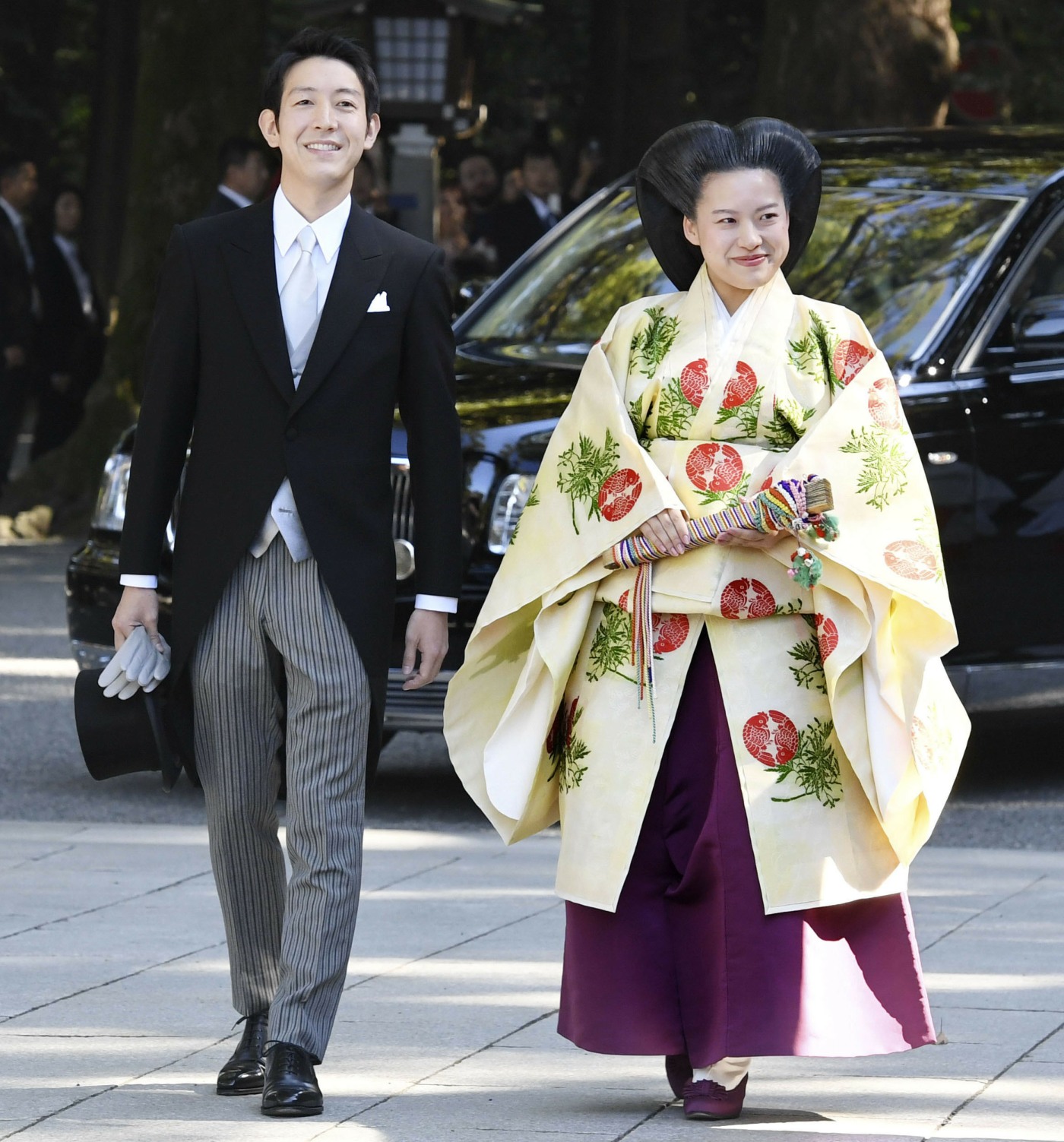
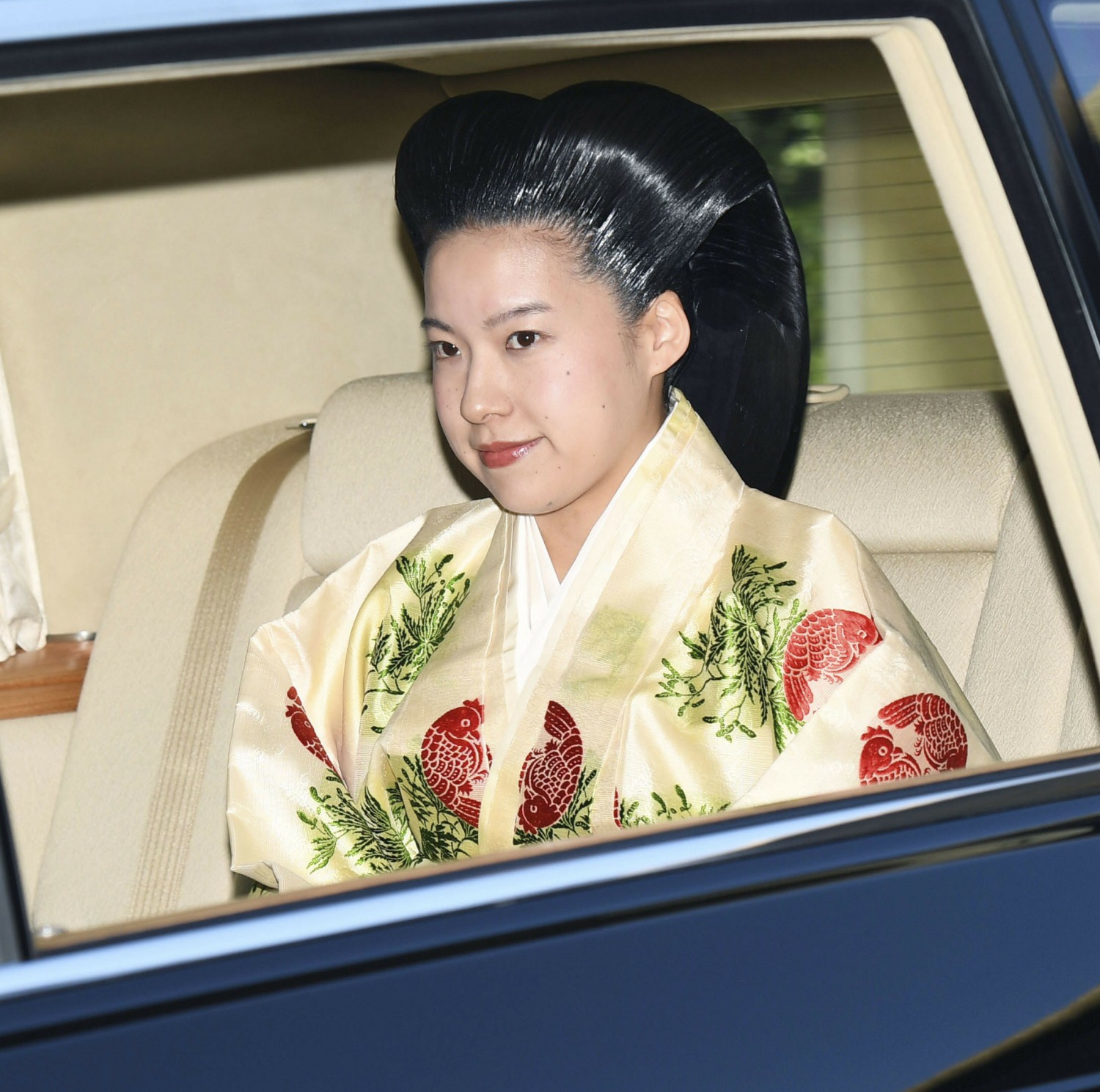
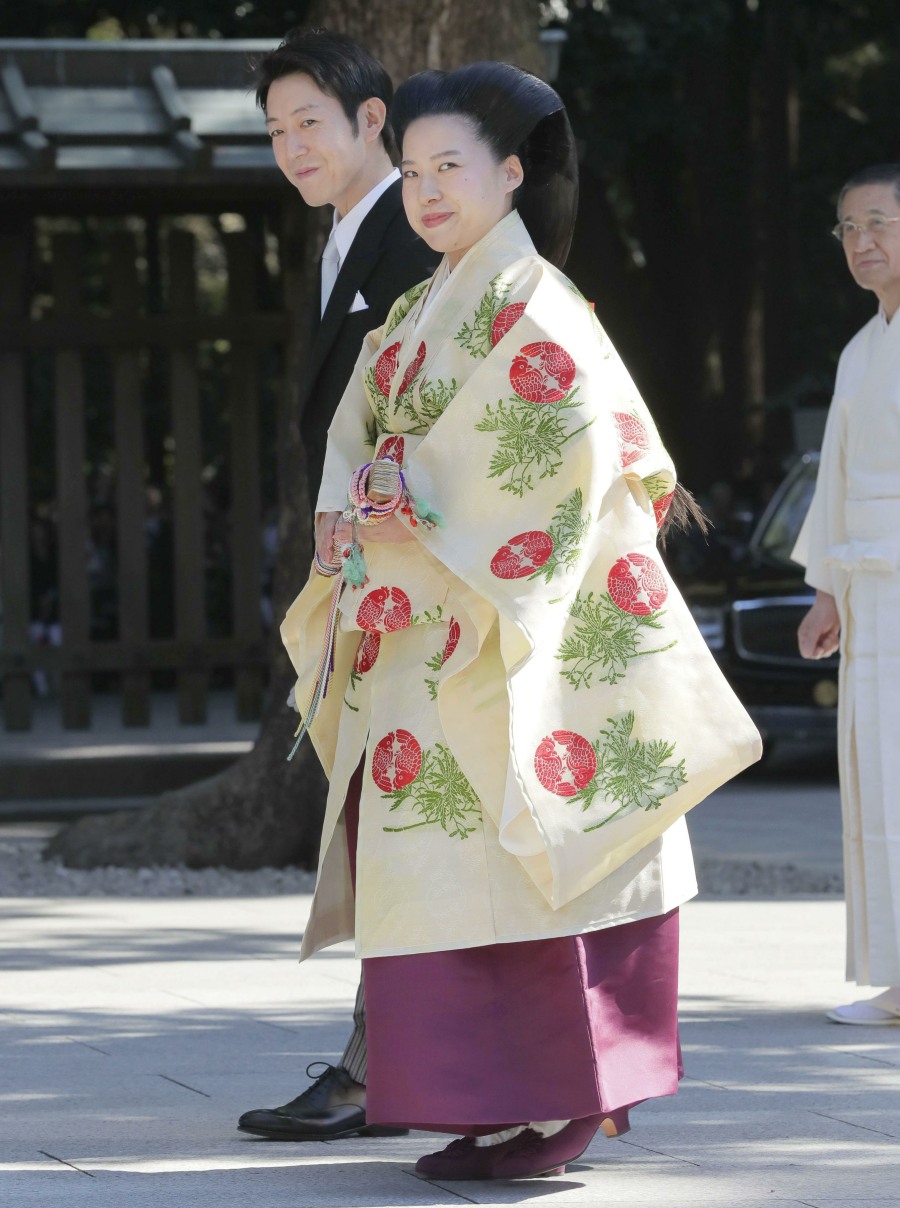
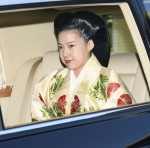
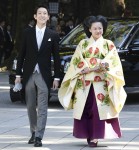
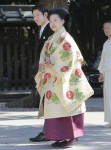










True. Change the law.
This is sweet. It sucks that she has to lose her title and STILL have to do the work – but I think she’s probably okay with it for the most part. She’s still involved in ‘normal’ (for her) family type functions, and she still got to marry the guy she loves.
She doesn’t “have to” do work. I mean they can hardly make her. It seems like she’s choosing to still do work to get that royal $$$$$.
Princesses who leave the family in Japan don’t get the stipend any longer. She got a lump sum at the time of her marriage for “future expenses” and that’s it.
Seems kind of sad to ask someone to work for you if you don’t even have the courtesy to pay them.
Yeah did she want to give up the work? I doubt she was forced into it. The whole titled and entitled thing bugs the hell out of me. God forbid someone should actually want to do charity work, even without a title.
Why is she in traditional Japanese clothing while he is wearing western clothing? I would be interested in understanding this tradition.
Just personal choice from what I understand. She wanted a traditional dress. It’s stunning, I can understand why.
I think it’s just the bride and groom preferences? When I do get marry, I’ll want to wear our traditional tunic dress at some point, but I prefer my fiance to not wear the men’s tunic… It’s just solely based on looks, and me not liking how men looks in it 🙂
She so pretty! I wonder if it’s homage to her Royal house and its proud Japanese heritage? Like she’s not turning her back on her family/traditions just choosing to marry a man she loves? It’s beautiful either way. Any history lesson on the White paint (powder?) for the face from movies and also what was used in ancient times to hold the hair that stiff before hair gel and hair spray?
If she divorced him (not wishing for that!) does she gain her title again? Do the Princes also lose their titles if they marry a commoner?
No the princes do not lose their titles. This law is a result of General MacArthur stripping down the monarchy after WWII – as an American he didn’t believe in an imperial system, but saw it as a necessary evil to keep the family around to help maintain equilibrium in Japan, post-war. This is combined with a hefty dose of exisiting sexism in Japan where there are no female heirs in the imperial family – an issue that was faced when the Crown Prince and Princess had “only” a daughter.
Because he is a commoner, I would bet.
I know this is politically incorrect, but my first thought seeing her wedding attire was “One wouldn’t even have to diet for your wedding day pictures!” 😀
I like to think of this as Providence reminding those institutions and families where women are not treated equally that inequality has tremendous cost. Sometimes a particular sex runs in families, it’s just genetics. If princesses could keep their titles the royal family would have a thriving matriarchy; instead they’re barely hanging on.
Remember historically that marriages were for alliances or to bring more wealth to families increasing their power. Both men and women were expected to make good matches for the sake of the family. The idea of marriage for love is very knew in Western culture so maybe it’s the same for the Japanese too? Just wondering.
No, as I mentioned above, this is a relatively modern law that stems from General MacArthur when he had control of Japan post WWII. It is a law that is deliberately designed to keep the imperial family as small as possible. He also stripped the nobility of their titles, so there is no way for a princess of Japan to marry anyone BUT a commoner now – unless invest is involved.
Sure in ancient times it made sense. It’s the same reason in European royal families when the queen marries her husband is “just” a prince. Because a King is presumed to be in charge. But we move forward or we fade away. They’re totally within their rights to keep the status quo…but they are getting dangerously close to status quo-ing themselves out of existence.
Eh…sort of. It was definitely the standard for nobility because they had titles and inheritance to consider, but the idea of marrying for love was already gaining traction around Shakespeare’s time in the West. (It’s part of why “Taming of the Shrew” was one of his more controversial works in his time.) This idea of fourteen year old girls being auctioned off to men three times their age as the norm is a mischaracterization of Occidental history. It happened, especially among royalty (and even in many cases, it was understood the marriage would be consummated when they were older), but really, the average age for marriage back then was twenties. Even uneducated peasants knew enough to realize female children having children was not optimal. The dangerous of childbirth would have been very well known.
Can’t speak for Japan. The culture is definitely less individualistic and more community-driven, though the above rings true since I do recall America having a lot of influence on reshaping the Imperial family after WWII.
This happens to a lot of royal families. See also: the Russian imperial family (multiple times over the centuries), the Habsburgs in Spain, a whole bunch of the German minor royal houses.
At some point or another, biology just stops working in your favour. It’s kind of why monarchies based on the inherited right to rule very rarely make much sense.
I’m assuming the patronages are something she cares about and enjoys doing, but still, it doesn’t seem right that she has to continue with them unless she’s getting some Princess income.
That yukata is beautiful and her husband is CUTE.
Just an FYI – this is a kimono, not a yukata. A yuakata is a thin summer kimono – usually in cotton. This is a full-blown, formal, thick, silk kimono. A Japanese woman would never wear a yukata to her wedding. 😉
Totally! Unless it took place on a beach or at burning man or something. 😀
Thank you for interesting info!
She understands her culture and its requirements. Everything doesn’t always need to be changed.
Ehhh except it isn’t the requirement. She shoukd renounce and is done. Except she renounces and still has to do the work?
This is a system that, if I understand correctly, punishes women for marrying commoners but doesn’t do the same for men. It’s repugnant. It absolutely needs to be changed.
Every country is not going to operate as America does or would.
Gigi, not only this is women’s right issue it’s just a problem for the royal family. They are running out of the members. Have you looked at imperial Japanese family tree? Nearly all are either elderly or women in a marriable age. And after WWII all Japanese are commoners apart form the royals so they can’t find anyone to marry.
I agree with you Gigi. If there is a voice for change among female royals in Japan and the Japanese people, that’s fantastic. But if it is something that the female royals and the Japanese people are okay with – then so be it. There’s nothing illegal or nefarious going on, so who are we as outsiders to demand they change. Especially considering everything going on in Japan, a few Princesses losing their titles after marriage are not top on the list of things the Japanese are worried about.
Also did anyone stop to consider that maybe it would be best to let the Royal Family die out….it is afterall the 21st century and people are constantly badgering on about how the U.K. and other countries should abolish the monarchy. Maybe the Japanese house will simply die out. There are worse things that could happen.
At the end of the day, it’s up to the Japanese to determine this.
Except for two things:
1. This law stripping her of her title doesn’t actually stem from Japanese culture. It stems from General MacArthur post WWII and his moves to restrict, depower and minimise the imperial family as much as possible. There is a strong respect for tradition and the imperial family in Japan and I highly doubt they want to see their imperial family gone. So there’s a very good argument for changing this law – which was imposed upon the Japanese by the US in the first place – in order to preserve and update the imperial family.
2. Japan has a LOT if issues with sexism. I mean a LOT. These issues are rampant at every level of society. Moves need to be made at all levels to solve these issues – something they are aware of, but slow to act on. Changes to the imperial family showing more equality between the sexes are imperative as they are a signal from the top and currently the IHA enforces ancient standards that are incredibly sexist when it comes to the family. Change must happen.
I understand that but it still doesn’t change the fact that Japan is a sovereign nation and there’s nothing illegal or nefarious going on. It’s up to them to change – it’s not up to non Japanese to demand or force change upon them. Again, at the end of the day it’s up to the Japanese to decide the direction of their country and their monarchy. I would imagine though, that they are probably more concerned with their aging population and the fact their birth rates continue to plummet.
The current law as it exists was enforced by non-Japanese elements though. I think it’s quite ridiculous that countries like the USA insist on certain legalities then turn around and act like it’s the Japanese who are utterly backward for having to follow those legalities.
Eh, it’s definitely a sexist system, but I’m not worried for her sake. She made the choice knowing full well she would be cared for financially in that marriage. Rich people are not the ones to spearhead change as it is, and the Imperial family is a figurehead movement at this point, anyway.
Now the big story that came out earlier this year about Japanese medical schools lowering women’s scores to keep them out of the program? THAT is the kind of sexist shit Japan needs to be addressing in their culture. That kind of internalized misogyny is an issue that’s hurting them across the board as a society, both for the unqualified women who lost positions to less qualified men AND because they’re facing a doctor shortage as is.
She’ll be fine, but the Imperial family, not so much. If the Japanese care enough to keep it around, even as a figurehead movement (and it seems like they do), then the fact that they’re literally down to maybe a handful of men (two of them octogenarians, two of them in their fifties, and one of them a teenager) doesn’t bode well for their future.
The sexism in Japanese culture permeates all across the board. The Imperial family certainly isn’t inured from it. Whether it’s a doctor shortage or a shortage of eligible members in the Imperial family, the fact that they’re a culture that’s willing to discount perfectly eligible, qualified people purely on the basis of their gender is hurting them.
I just want to know which hair product(s) was/were used to get her hair like that!
Yes any ideas out there? Can’t be all gel and aqua net right?
It may be real, but I’ve seen a lot of traditional Japanese brides use wigs to get that look.
But who is funding them even if one losses a title? If they’re still funded by the public, I think it’s fair.
I’m 99% sure they aren’t funded by the public. Also, apparently he is very, very wealthy so she’s not going to be hurting for money and she probably inherited some wealth.
When Japanese princesses marry commoners, they not only give up the title but the perks. I imagine she truly enjoys her patronages so she doesn’t mind working for them even if she isn’t funded, though. The throne is going to die out though if they don’t change the law, which is inherently unfair in itself, as most of the remaining male royal members are elderly.
If they’re not funded by the public then it’s very considerate of her and she is aware of her privilege. In her case, seems like it’s not that she has to work, but she wants to work. That’s great.
If they lose their title, they are not funded, period. That’s the rule.
That is one good looking couple.
I wish they showed THIS ceremony on TV! I speak Japanese, watch NHK (which feels like the only channel for mentally stable grownups with a quirky sense of humor and old fashioned values) and adore so many things about their culture.
As far as her having to work, that’s very Japanese. They pride themselves on doing their part and contributing to society.
Since her mother and grandmother form commoner backgrounds who are widowed have titles and princess by blood does not seem right. Everyone apart from the royal family in Japan are commoners so it would be impossible for the princesses to keep their titles (unless foreign royalty is fine, that would be actually interesting if Japanese princess married into firing royal family.)
With the royal family so small and the married princesses forced to leave Japan could at least make the first step that the current Emperor’s decendants would all keep titles even married as long as he lives. So Ayako would not keep the title but Mako would at least for a while.
I plan to travel to Japan someday because I think it is a beautiful country with a fascinating culture.
If you are a princess, and you marry a commoner in the Japanese imperial family, you leave the family, lose the title, and you lose the stipend that you get as part of the royal family. If you notice, a lot of the princesses are really well-educated and have multiple degrees and jobs. They could inherit their parents’ personal fortunes, but their upkeep is no longer covered by government expenditure.
Frankly, I think it’s ridiculous to expect her to do royal work when she likely isn’t getting compensated for it. Why? There is only one male heir right now, and he’s super young. His sister is Princess Mako, and I’m guessing that the reason she’s holding off on her marriage is because she’s the Emperor’s granddaughter. He’s due for retirement next year, and given the dearth of eligible royals to carry out official duties, I’ll bet anything that Mako was asked to wait a few years so that they could squeeze more work out of her too.
This remains a topic of contention with the Japanese imperial family tbh. For a while there, it seemed as though they would change the law to make it eligible for women to inherit the throne. But they have since had one male heir, which has shelved those plans, but it doesn’t solve their other issues. For the moment, the future of the RF rests on the shoulders of one kid, and unless they make some official changes soon, it’s not looking too good for them.
That is some seriously archaic BS. Get with the modern program, Japan.